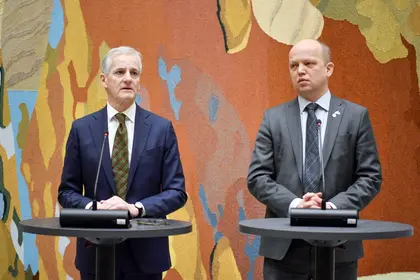Accused of being a war profiteer as prices for its gas have soared, Norway on Monday, Feb. 6, unveiled a major aid package for Ukraine and other countries affected by the conflict.
The government proposed a five-year aid package to Ukraine worth 75 billion kroner ($7.3 billion).
JOIN US ON TELEGRAM
Follow our coverage of the war on the @Kyivpost_official.
"We are proposing that Norway gives a binding and lasting contribution to Ukraine, over several years," Prime Minister Jonas Gahr Store told reporters.
"Ukraine should know that we stand by its side...and Russia should understand that free and democratic countries are supporting Ukraine," he said.
Ukrainian President Volodymyr Zelensky expressed his gratitude on Twitter, welcoming it as a "significant contribution to our future victory over the aggressor and successful post-war recovery".
The package of 15 billion kroner per year is expected to cover humanitarian and military aid and will be divided equally between the two for this year.
The final amount of the package may however be changed by parliament, where the center-left government does not hold a majority and relies on the backing of other parties to pass legislation.
Some of them have already reacted positively.
Store also proposed a five-billion-kroner increase in aid "to countries in the (global) South most affected by the war in Ukraine", due primarily to the rising cost of food and commodities.
- ' Passive war profiteer' -
The Norwegian government was harshly criticized last year for reducing its 2023 development aid budget -- to 0.75 percent of gross national income, lower than the usual one-percent target -- at a time when the country's gas revenue was soaring due to the war in Ukraine.

Russia Hurls Intercontinental Missile at Ukraine: A Shocking Escalation
In 2022, Norway overtook Russia as Europe's biggest gas supplier, as prices skyrocketed to record levels.
According to its own calculations, the Norwegian state registered more than 1.0 trillion kroner in unexpected oil and gas revenues last year.
Oslo is set to post a record budget surplus this year of 1.13 trillion kroner, which will further boost the country's sovereign wealth fund, the biggest in the world.
These exceptional gains, in a country already among the richest in the world, have sparked calls both in Norway and abroad for a redistribution of the windfall.
"Our enormous profits are the enormous losses of others," Norwegian economists Kalle Moene and Ottar Maestad wrote in a column in November.
"We have become a kind of involuntary and passive war profiteer."
"The additional revenue of at least 1.0 trillion kroner that Norway has pocketed because of the war do not, from a moral point of view, belong to us," they said.
Like these economists, others have called for the money to go into a future international fund aimed at helping the victims of the conflict around the world and, when the time comes, for the reconstruction of Ukraine.
- Nansen plan -
Norway's prime minister has meanwhile dismissed the allegations of war profiteering.
"It's a notion that I flatly refuse," Store said last week in an interview with AFP.
"Norway has for 50 years been an explorer, at some risk, and seller of energy resources, oil and gas," he said.
"Norway does not fix those prices."
The Scandinavian country's aid to Kyiv had until now appeared modest. Oslo donated 10.7 billion kroner to civilian and military aid in 2022.
As a share of gross domestic product, that puts Norway in 15th place in a ranking by the Kiel Institute for the World Economy.
The aid plan proposed on Monday has been dubbed "Fridtjof Nansen", after Norway's famed 19th-century polar explorer and diplomat.
Nansen was instrumental in organizing humanitarian aid to the Soviet Union during the devastating famine of the early 1920s.
You can also highlight the text and press Ctrl + Enter






